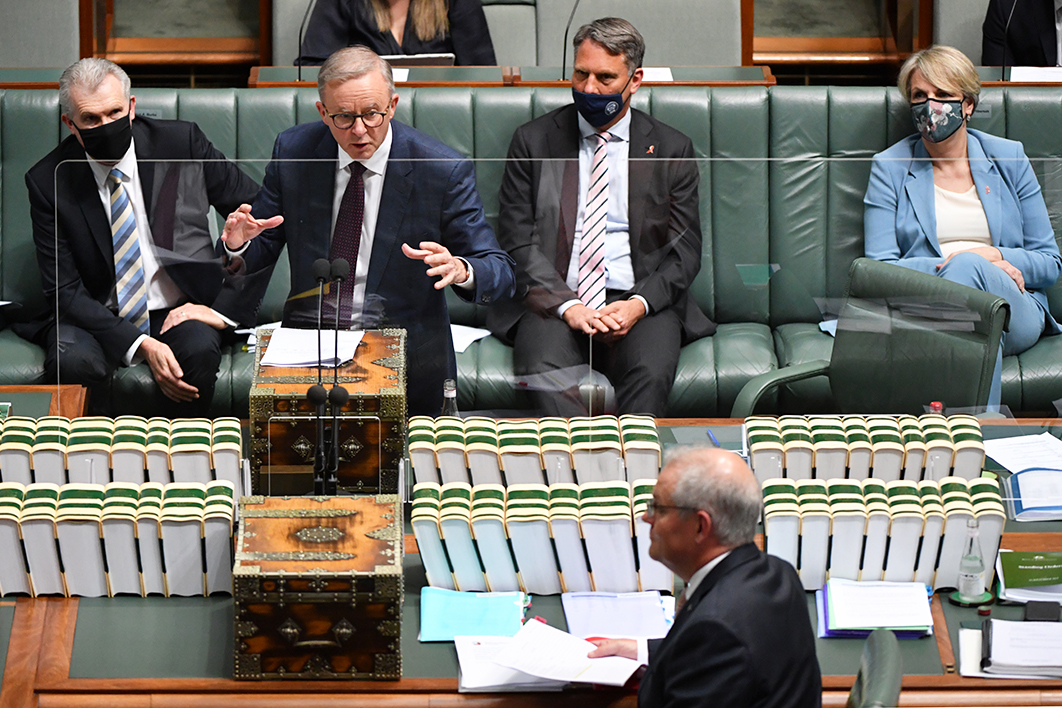The emergence of Omicron risks derailing Scott Morrison’s ambition to revert to the old normal. The doona that the PM has long urged Australians to get out from under has partly been pulled back up again, with some familiar restrictions reintroduced at state and federal levels.
Nonetheless, Morrison is hoping the setback will only be temporary and he can soon return to his promise to protect Australians from big government while letting rip “can-do capitalism.” He is courting voters who opposed major public health restrictions during the pandemic by arguing that it is time for government to step out of the way.
Despite a post-Covid spin, that rhetoric isn’t really new. Morrison went to the last election making a populist promise to protect ordinary Australians from a big, intrusive, high-taxing Labor government. His current arguments are largely a post-Covid variation on that old neoliberal, pro-market theme — though, given his criticism of official intrusion, it is ironic that his government has long exhibited an authoritarian tinge, especially when it comes to groups and perspectives it disagrees with.
Those Australians who hoped the Coalition might have learned from the economic stimulus measures it introduced during the pandemic will be sadly disappointed, particularly when it comes to the economic and social benefits that flowed from increasing unemployment benefits. The government even briefly offered free childcare. It was all a long way from the severely restricted role the prime minister sees government playing in helping rebuild the Australian economy after the pandemic, never mind tackling major issues such as climate change.
But the Coalition isn’t alone in turning to the past. Labor has been casting around for previous economic models too. Early in the pandemic Labor shadow treasurer Jim Chalmers evoked the Curtin and Chifley government’s Keynesian postwar reconstruction plans of the early 1940s: a model that sees a greater role for the state in a mixed economy than does Morrison’s can-do capitalism.
More recently, Chalmers has also been evoking British Labour’s Tony Blair by seeking to brand Labor as the “party of aspiration.” Such a flirtation isn’t new, as Labor leaders Simon Crean and Mark Latham demonstrated twenty years ago. But Chalmers should be cautious, given that those previous evocations of Blair didn’t end well for the Australian party.
Nonetheless, following an inspiring video call with Blair, and building on his own arguments, Chalmers has highlighted the role that technology can play in improving the economic wellbeing of citizens. Two decades ago, the Blair government optimistically promised that Britain would once again be a world-leading economy via its technological prowess in the information revolution. Paul Keating had embraced the opportunities of the new information economy years before Blair. New technologies can indeed bring great benefits, but they also risk deepening inequality — a risk that Chalmers, like earlier Labor figures including Keating, may well have underestimated.
It’s back to the future in other ways, too. Chalmers’s electoral focus on the suburbs has echoes of Mark Latham’s period as a Labor politician, when he published a book called From the Suburbs. Like Chalmers, former Labor leader Kim Beazley also pledged to respond to the issues that middle Australians are discussing around their kitchen tables.
With its cautious, small-target strategy, Labor appears to have backed away from Shorten-era hints that it might address some of the industrial relations policy failures of previous Labor governments, including Keating-era enterprise bargaining policies and the Rudd–Gillard government’s outlawing of pattern bargaining on an industry-wide basis. While Labor has been loath to acknowledge the problem explicitly, its own policies actually contributed to the wage stagnation that Labor now pledges to tackle.
So the industrial relations challenge for Labor is not just to deal with Coalition policies but also to tackle its own past. While it has kept the Shorten-era promise to tackle precarious work — an issue that the pandemic has brought into even greater prominence — in other respects it often seems to be returning to an earlier model. In its attempts to repair the damage that Shorten’s attacks on the big end of town inflicted on the party’s relations with business, it has ended up placing less emphasis on issues of economic equality.
For his part, Morrison is threatening to make waterfront industrial relations a major issue, echoing the Howard government’s targeting of the Maritime Union of Australia more than twenty years ago. The government has also been returning to past Coalition election strategies in its suggestions that Labor is soft on China.
Culture-war issues are also being raised, most recently with the introduction of the government’s religious freedom bill. While this legislation is close to Morrison’s heart, he also sees it as an opportunity to wedge Labor. He has incorrectly implied that the lack of protection against religious discrimination — alongside laws against sexual or racial discrimination — represents a failure of the left. But it was conservative Christians who campaigned for years against laws to protect religious freedom, including when the previous Labor government considered introducing such protections. Those Christians were concerned about these protections extending to non-Christian religions and the possible implications for Christian religious instruction and state aid to church schools. The problem for the left lies not in protecting people of faith against religious discrimination but in dealing with arguments that “religious freedom” should enable believers to discriminate against others.
True, predicting the political future is even harder than usual. Time and time again the virus has refused to cooperate with politicians’ best-laid plans. But those who hoped that the post-Covid world would see a radically “better normal” seem destined to be disappointed. In the lead-up to the next election, both Labor and Liberal have so far reverted unimaginatively to previous policy perspectives. Despite the pandemic, much of the next election seems likely to be fought on familiar ideological ground. •




